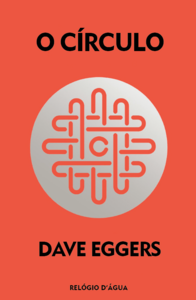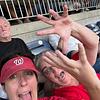Take a photo of a barcode or cover
This book is really hard to rate, and, as a friend put it, how much you like it sort of depends on your personal beliefs regarding "technology connecting the world and eliminating privacy." I love Dave Eggers and the way he tells a story, and though the plot and the characters are fully realized, the book sort of rang hollow to me.
Not the best book I've ever read, but the pacing of the story was excellent and I felt truly caught up in the cult experience while reading. The pacing helped illuminate the small actions that add up to large consequences, and how quickly one can be overwhelmed by their own doings.
More than anything else, I docked points off of this book because Mae was a character without ideas, dreams, hopes, or longings. Her only true want was sexually driven, and lent nothing to character. Outside of that, she's flat as paper, and ineffective as a conduit through which the author can pass on his main point. I mean, I get the point. Eggers wants us to conceptualize how devastating a loss of privacy would be to society and humanity. But I got that point before I dove into the book. Of course that would be bad. I'd be more interested in seeing the long-term ramifications privacy loss would have. How would global relations change? What would be the driving force behind the economy? How would the poor be indoctrinated? If you chose not to post, how would the Circle enforce this? I wish Mae had parts to her that challenged the idea, parts that ultimately had to be squashed by the Circle.
More than anything else, I docked points off of this book because Mae was a character without ideas, dreams, hopes, or longings. Her only true want was sexually driven, and lent nothing to character. Outside of that, she's flat as paper, and ineffective as a conduit through which the author can pass on his main point. I mean, I get the point. Eggers wants us to conceptualize how devastating a loss of privacy would be to society and humanity. But I got that point before I dove into the book. Of course that would be bad. I'd be more interested in seeing the long-term ramifications privacy loss would have. How would global relations change? What would be the driving force behind the economy? How would the poor be indoctrinated? If you chose not to post, how would the Circle enforce this? I wish Mae had parts to her that challenged the idea, parts that ultimately had to be squashed by the Circle.
I thought this book was just okay. I think it was the main character that made me not so into it. She just didn't seem to think that the stuff that happened was cause for concern or have remorse. The book does make you think though about how far technology should go when it comes to privacy.
It's been a long time since I stayed up past my bedtime to finish a book, but it was a necessity with this one. Dave Eggers' invented worlds is completely plausible, already starting, and totally terrifying. Highly recommended.
Meh. There's a lot I didn't like about this, aside from the issues raised by a totalitarian social network.
The sex scenes were bizarre and unnecessary, with lines like "...so deep she could feel his swollen crown somewhere near her heart," and Mae daydreaming about how "She wanted to be back in that bathroom sitting on him, feeling the crown of him push through." Bleh. I can't imagine a woman ever thinking about sex this way.
The dialog seemed largely interchangeable, so most characters working at the Circle could well have been the same person, Bailey seemed exactly the same as the people working at HR. Most of the plot was driven by pedantic dialog of some higher up person grilling Mae until she agrees that she was wrong, and the Circle is wonderful. Mae lacks any depth and just serves as a sponge to absorb the Circle's dogma.
Also, there's an allegory throughout the book involving a shark harvested from a deep sea exploration of the Mariana Trench, and they put it in an aquarium and watch it eat an increasingly weird selection of animals, sea horses, a tuna, an octopus, an entire sea turtle, for seemingly no reason. It's such a heavy handed metaphor for the Circle, which is annoying in it's own right, but also was so scientifically impossible that I just got frustrated every time they kept coming back to this stupid aquarium. You can't take a creature living in the conditions of the Mariana Trench, raise it to the surface, and then expect it to survive in a normal salt water coral filled fish tank.
I finished the book feeling entirely frustrated. The upside was that the audiobook narrator was excellent, and it did keep my interest well enough to want to finish it.
The sex scenes were bizarre and unnecessary, with lines like "...so deep she could feel his swollen crown somewhere near her heart," and Mae daydreaming about how "She wanted to be back in that bathroom sitting on him, feeling the crown of him push through." Bleh. I can't imagine a woman ever thinking about sex this way.
The dialog seemed largely interchangeable, so most characters working at the Circle could well have been the same person, Bailey seemed exactly the same as the people working at HR. Most of the plot was driven by pedantic dialog of some higher up person grilling Mae until she agrees that she was wrong, and the Circle is wonderful. Mae lacks any depth and just serves as a sponge to absorb the Circle's dogma.
Also, there's an allegory throughout the book involving a shark harvested from a deep sea exploration of the Mariana Trench, and they put it in an aquarium and watch it eat an increasingly weird selection of animals, sea horses, a tuna, an octopus, an entire sea turtle, for seemingly no reason. It's such a heavy handed metaphor for the Circle, which is annoying in it's own right, but also was so scientifically impossible that I just got frustrated every time they kept coming back to this stupid aquarium. You can't take a creature living in the conditions of the Mariana Trench, raise it to the surface, and then expect it to survive in a normal salt water coral filled fish tank.
I finished the book feeling entirely frustrated. The upside was that the audiobook narrator was excellent, and it did keep my interest well enough to want to finish it.
This was a refreshing dystopian novel that hits a little too close to home. The fast pace puts you right in the mind of someone who is fully on board
dark
reflective
sad
tense
medium-paced
Plot or Character Driven:
Plot
Strong character development:
Yes
Loveable characters:
Yes
Diverse cast of characters:
Yes
Flaws of characters a main focus:
Yes
Sci-fi dystopian moral fable that would have been stronger and more resonant with more realistic and varied POV characters and much more social realism (including credible opposition to the Circle's hegemony, if not in the U.S. than internationally, and the Circle's agenda unfolding more gradually and believably over a longer time scale).
Still, taken as a portrait of the seduction of authoritarianism on the type of person with very little capacity for critical thought and abundant narcissism, The Circle has its merits. It was both irritating and compelling to follow the complete mindlessness of stealth villain protagonist Mae's journey from blank slate who follows fascist instincts that are encouraged by her mentors into a supervillain bent on literal world domination (although positioning her at the center of the action is a big stretch made for narrative convenience - with more realistic worldbuilding, given her characterization, Mae would be more typical of a worker drone, not one of its )
Still, taken as a portrait of the seduction of authoritarianism on the type of person with very little capacity for critical thought and abundant narcissism, The Circle has its merits. It was both irritating and compelling to follow the complete mindlessness of stealth villain protagonist Mae's journey from blank slate who follows fascist instincts that are encouraged by her mentors into a supervillain bent on literal world domination (although positioning her at the center of the action




